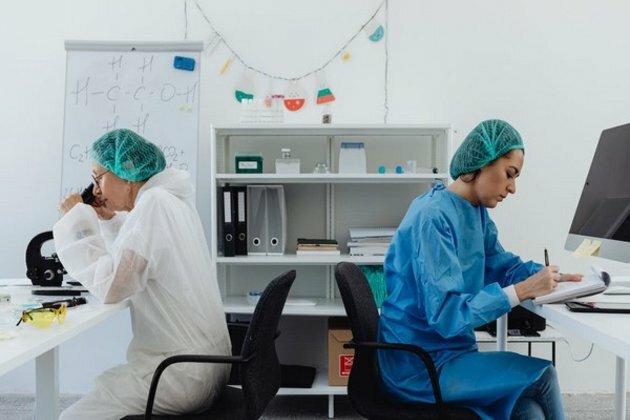Researchers target stem cells in human stomach to treat diabetes
ANI
26 May 2023, 10:25 GMT+10

New York [US], May 26 (ANI): A potential strategy for treating diabetes uses stem cells from the human stomach to create cells that release insulin in response to rising blood sugar levels.
According to a preliminary study conducted by Weill Cornell Medicine researchers and their work which was published on April 27 in Nature Cell Biology, the researchers demonstrated that they could directly reprogram stem cells isolated from human stomach tissue into cells that closely resemble beta cells, the pancreatic insulin-secreting cells. In a rat model of diabetes, transplants of tiny clusters of these cells restored disease symptoms.
This is a proof-of-concept study that gives us a solid foundation for developing a treatment, based on patients' own cells, for type 1 diabetes and severe type 2 diabetes," said study senior author Dr. Joe Zhou, a professor of regenerative medicine and a member of the Hartman Institute for Therapeutic Organ Regeneration at Weill Cornell Medicine.
Insulin is a hormone that regulates blood glucose levels--without it, blood glucose becomes too high, causing diabetes and its many complications. An estimated 1.6 million Americans have type 1 diabetes, which results from an autoimmune attack that destroys beta cells in the pancreas. At least several million other Americans lack sufficient beta cells due to severe type 2 diabetes. Current treatments in such cases include manual and wearable-pump injections of insulin, which have multiple drawbacks including pain, potentially inefficient glucose control, and the necessity of wearing cumbersome equipment.
Biomedical researchers aim to replace beta-cell function in a more natural way, with transplants of human cells that work as beta cells do: automatically sensing blood sugar levels and secreting insulin as needed. Ideally, such transplants would use patients' own cells, to avoid the problem of transplant rejection.
Dr Zhou has been working toward this goal for more than 15 years. In early experiments as a postdoctoral researcher, he discovered that ordinary pancreatic cells could be turned into insulin-producing beta-like cells by forcing the activation of three transcription factors--or proteins that control gene expression--resulting in the subsequent activation of genes required for the development of normal beta cells. In a 2016 study, again in mice, he and his team showed that certain stem cells in the stomach, called gastric stem cells, are also highly sensitive to this three-factor activation method.
"The stomach makes its own hormone-secreting cells, and stomach cells and pancreatic cells are adjacent in the embryonic stage of development, so in that sense it isn't completely surprising that gastric stem cells can be so readily transformed into beta-like insulin-secreting cells," Dr. Zhou said.
Attempts to reproduce these results using human gastric stem cells, which can be removed from patients relatively easily in an outpatient procedure called endoscopy, were slowed by various technical hurdles. However, in the new study, led by first author Dr. Xiaofeng Huang, an instructor of molecular biology in medicine at Weill Cornell Medicine, the researchers at last achieved success.
After turning human gastric stem cells into beta-like cells, the team grew the cells in small clusters called organoids and found that these organ-like pieces of tissue quickly became sensitive to glucose, responding with secretions of insulin. When transplanted into diabetic mice, the beta-like organoids functioned largely as real pancreatic beta cells would, secreting insulin in response to rises in blood glucose, and thereby keeping blood glucose levels steady. The transplants also kept working for as long as the researchers monitored them--six months--suggesting good durability.
Dr Zhou said that he and his lab still need to optimize their method in various ways before it can be considered for clinical use. Necessary improvements include methods to increase the scale of beta-cell production for transplants to humans, and modifications of the beta-like cells to make them less vulnerable to the type of immune attack that initially wipes out beta cells in type 1 diabetes patients.
Ultimately, the researchers hope to develop a technique enabling the relatively easy harvesting of gastric stem cells from patients, followed by the transplant, weeks later, of insulin-secreting organoids that regulate blood sugar levels without the need for further medication. (ANI) Share
Share
 Tweet
Tweet
 Share
Share
 Flip
Flip
 Email
Email
Watch latest videos
Subscribe and Follow
Get a daily dose of New York Telegraph news through our daily email, its complimentary and keeps you fully up to date with world and business news as well.
News RELEASES
Publish news of your business, community or sports group, personnel appointments, major event and more by submitting a news release to New York Telegraph.
More InformationBusiness
SectionUS debt limit raised, but spending bill fuels fiscal concerns
NEW YORK CITY, New York: With just weeks to spare before a potential government default, U.S. lawmakers passed a sweeping tax and spending...
Shein hit with 40 million euro fine in France over deceptive discounts
PARIS, France: Fast-fashion giant Shein has been fined 40 million euros by France's antitrust authority over deceptive discount practices...
Meta hires SSI CEO Gross as AI race intensifies among tech giants
PALO ALTO/TEL AVIV: The battle for top AI talent has claimed another high-profile casualty—this time at Safe Superintelligence (SSI),...
Engine defect prompts Nissan to recall over 443,000 vehicles
FRANKLIN, Tennessee: Hundreds of thousands of Nissan and Infiniti vehicles are being recalled across the United States due to a potential...
Microsoft trims jobs to manage soaring AI infrastructure costs
REDMOND, Washington: Microsoft is the latest tech giant to announce significant job cuts, as the financial strain of building next-generation...
Stocks worldwide struggle to make ground Friday with Wall Street closed
LONDON UK - U.S. stock markets were closed on Friday for Independence Day. Global Forex Markets Wrap Up Friday with Greeback Comeback...
New York
SectionUS debt limit raised, but spending bill fuels fiscal concerns
NEW YORK CITY, New York: With just weeks to spare before a potential government default, U.S. lawmakers passed a sweeping tax and spending...
Engine defect prompts Nissan to recall over 443,000 vehicles
FRANKLIN, Tennessee: Hundreds of thousands of Nissan and Infiniti vehicles are being recalled across the United States due to a potential...
Trump wins $16 million settlement from Paramount over CBS Harris edit
NEW YORK CITY, New York: Paramount has agreed to pay US$16 million to settle a lawsuit brought by U.S. President Donald Trump over...
Greenback slides amid tax bill fears, trade deal uncertainty
NEW YORK CITY, New York: The U.S. dollar continues to lose ground, weighed down by growing concerns over Washington's fiscal outlook...
Aaron Judge, Max Fried help Yankees snap six-game skid, beat Mets
(Photo credit: Vincent Carchietta-Imagn Images) Aaron Judge hit his 33rd home run of the season and finished with three RBIs to help...
Liberty drops third of four in home loss to Storm
(Photo credit: John Jones-Imagn Images) Seattle rookie Dominique Malonga tied a career high with 11 points and Gabby Williams had...











